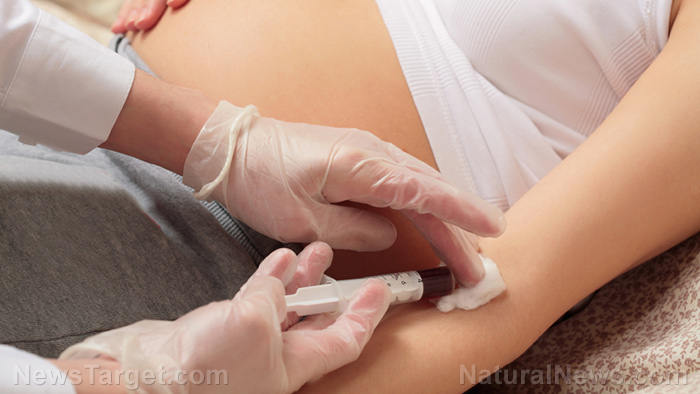
- 2021-02-01
- 0.0 Reitingas
- 749 Peržiūrų
- Aptarti
(Paranormal) The World Health Organization (WHO) warned that pregnant women should not get Moderna’s Wuhan coronavirus vaccine. It issued the warning because of insufficient data proving that it was safe for pregnant women. The global health body’s pronouncement applied to more than three million expectant mothers in the U.S., who are at a higher risk of suffering from severe COVID-19.
(Article by Ramon Tomey republished from NaturalNews.com)
In a Jan. 26 statement, the WHO said it did not recommend giving the Moderna mRNA shot to pregnant women. “While pregnancy puts women at a higher risk of severe COVID-19, the use of this vaccine in pregnant woman is currently not recommended,” the statement said. Frontline healthcare workers and those with underlying conditions are among the pregnant women at high risk for the disease.
WHO Department of Immunization, Vaccines and Biologicals Director Kate O’Brien stressed the need for clinical trials on pregnant women using the Moderna vaccine. “There is no reason to think there could be a problem in pregnancy. We are just acknowledging the data is not there at the moment,” she said during a Jan. 26 virtual press briefing.
A number of medical professionals have opposed the exclusion of pregnant women from vaccination. They argue that patients themselves should decide whether they want to avail of the jab or not. The American College of Obstetrics and Gynecology (ACOG) is among these parties against the exclusion of pregnant women from vaccination trials and guidance.
ACOG said in a statement that pregnant women should have the final say on taking the jab and be informed of any risks. “Pregnant individuals are more likely to have certain manifestations of severe illness associated with COVID-19 infection. Further, upwards of half of pregnant individuals also fall into another high-priority category – including frontline workers and those with underlying conditions,” it said.
The statement added that “ACOG continues to urge that for pregnant individuals, the decision to vaccinate must be left to each patient in [consultation] with their trusted clinician.”
Similar guidance has been issued for the Pfizer/BioNTech Wuhan coronavirus vaccine
Excluding pregnant women in vaccine trials is not an uncommon practice. However, doctors have expressed concerns about pregnant women being unable to receive the vaccine. Millions of pregnant or breastfeeding women are members of the workforce.
According to an October 2020 report by the U.S. Centers for Disease Control and Prevention (CDC), female workers comprise 75 percent of the healthcare workforce. About 330,000 healthcare workers “could be pregnant or recently postpartum at [the] time of vaccine implementation, it added. Furthermore, the report stated that pregnant COVID-19 patients are twice as likely to be admitted to intensive care units and thrice more likely to require a ventilator than non-pregnant patients.
U.K. Royal College of Midwives Director for Scotland Dr. Mary Ross Davie said: “There is not enough evidence to recommend vaccinating pregnant women against COVID-19. There is no evidence of harm, but there is also no current evidence of safety as pregnant women were excluded from all of the vaccination trials.”
A similar guidance had been issued with the earlier Pfizer/BioNTech Wuhan coronavirus vaccine. LifeSiteNews reported in early December 2020 that the British government warned against pregnant or breastfeeding women getting the BNT162b2 jab. According to U.K. authorities, the vaccine’s effects on fertility are still “unknown.”
The U.K. issued the warning in a 10-page guide outlining the vaccine’s proper storage, dilution and administration. Section 4.6 of the guide dealt with fertility, pregnancy and lactation. It said: “COVID-19 mRNA vaccine BNT162b2 is not recommended during pregnancy … [and] should not be used during breast-feeding.” The document also warned women of child-bearing age that “pregnancy should be excluded before vaccination” and that they should “avoid pregnancy for at least two months after their second dose.”
Head over to VaccineDamage.news to find more about the risks pregnant women face with COVID-19 vaccines.
Sources include:
CDC.gov [PDF]
Assets.Publishing.Service.gov.uk [PDF]
Pasaulio naujienas kitaip... skaitykite Paranormal Telegram, FB ir X(twitter) kanale...kadangi jau perskaitėte šį straipsnį iki pabaigos, prašome Jus prisidėti prie šio darbo. Skaitykite „Paranormal.lt“ ir toliau, skirdami kad ir nedidelę paramos sumą. Paremti galite Paypal arba SMS. Kaip tai padaryti? Iš anksto dėkojame už paramą! Nepamirškite pasidalinti patikusiais tekstais su savo draugais ir pažįstamais.
Turite savo nuomone, tapk autoriumi, prisijunk ir rašykite bloge. Dalinkitės receptais, sveikatos patarimais, nutikimais, susidūrėte su nekasdieniškais reiškiniais. Galite išversti iš užsienio kalbos, talpinkite su nuoroda. Laukiame Jūsų straipsnių, naujienų, apžvalgų ar istorijų!
Susijusios naujienos
Būkite pirmi, kurie pasidalins savo nuomonėmis su kitais.
Skaityti daugiau
Skaityti daugiau
Skaityti daugiau
Skaityti daugiau
Skaityti daugiau
Skaityti daugiau
